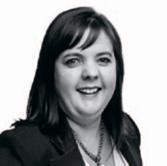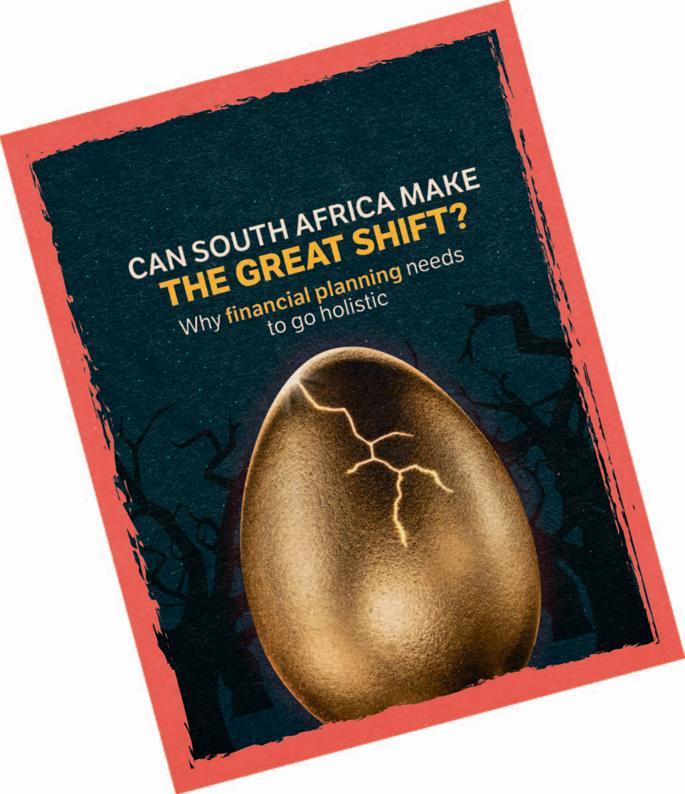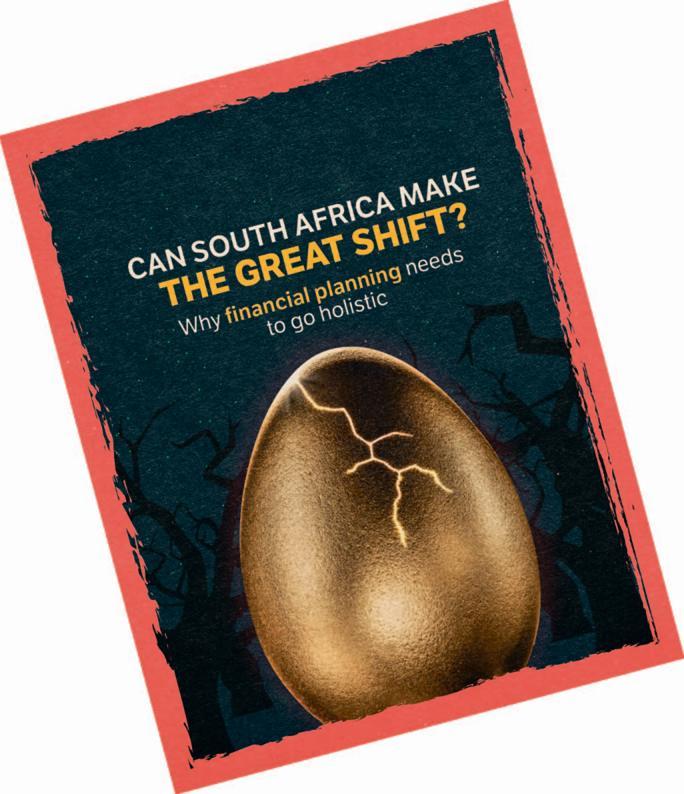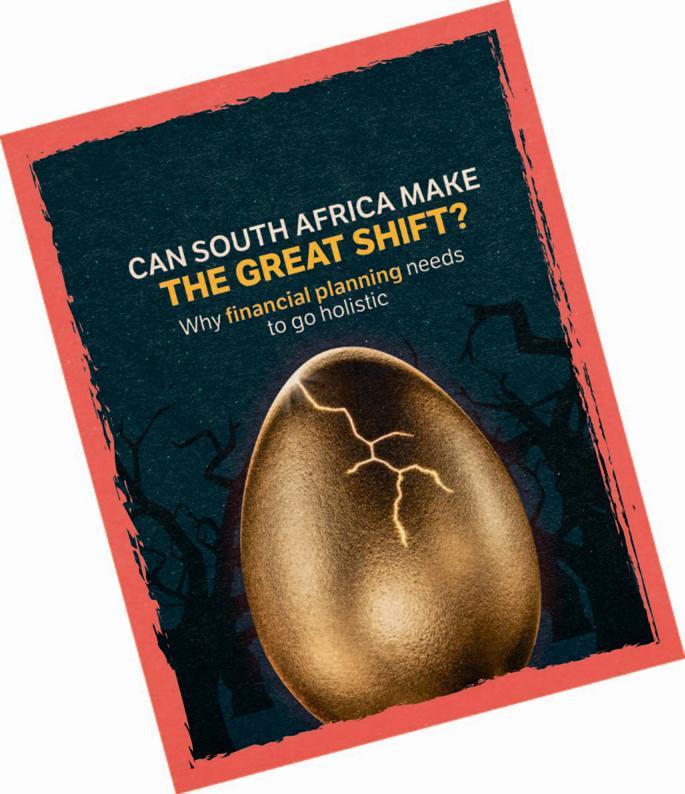September 21 2023
CONTRIBUTORS
Nici MacDonald • Lelané Bezuidenhout
Anne Cabot-Alletzhauser • Tal Edgars • Viwe Mngxaso
Gavin Smith • Caretha Laubscher • Gareth Colliers

David Crosoer • Jackie Palframan
Kobus Kleyn • Lizl Budhram

September 21 2023
Nici MacDonald • Lelané Bezuidenhout
Anne Cabot-Alletzhauser • Tal Edgars • Viwe Mngxaso
Gavin Smith • Caretha Laubscher • Gareth Colliers

David Crosoer • Jackie Palframan
Kobus Kleyn • Lizl Budhram
Collective Insight is a collaborative initiative published quarterly by the Financial Mail. The articles included here were selected by an independent Advisory
Commi ee to reflect some of the best insights from investment professionals, practitioners, and academics in relation to selected financial challenges
Collective Insight enjoys the support of the Gordon Institute of Business Science’s Responsible Finance Initiative, the CFA Society of South Africa, the Financial Planning Institute, ABSIP and the Actuarial Society of South Africa
Our vision was to create a journal that SA’s broader investment community and its stakeholders could collectively “own”, carrying content totally independent of commercial interests
For inquiries contact Anne Cabot-Alletzhauser on cabota@gibs.co.za
Convener:
Anne Cabot-Alletzhauser
Practice director of the Gordon Institute of Business Responsible Finance Initiative
Editorial advisory commi ee:
Kelly de Kock
Chief operating officer at Old Mutual Trust Company
Prof Evan Gilbert
Associate professor at Stellenbosch University and strategist at Momentum Investments
Amanda Khoza
Vice-president and board member of the Institute of Retirement Funds SA

Caretha Laubscher
Manager: Consumer Education Framework, Financial Sector Conduct Authority
Lelane Bezuidenhout
CEO Financial Planning Institute of Southern Africa
Nici McDonald
HOD: Certification and Standards, Financial Planning Institute of Southern Africa
Darius van der Walt
Member of the ASSA investment commi ee, head of product development at M&G Investments Southern Africa
Nerina Visser, CFA
ETF strategist and financial adviser etfSA
Langa Madonko
Principal for investor relations and capital raising at Summit Africa
Fran Troskie
Manager of research and investment advisory at PPS Investments
This edition of Collective Insights developed like a meme how it started vs how it ended
The initial premise was to collect commentary from the financial planning industry on the new global financial planning standards introduced earlier in the year
This question, however, gave our contributors a chance to highlight the bigger problems that are plaguing the industry in South Africa Clear themes emerged from the writings that showcased the issues still to be addressed in South Africa to ensure that financial planning and advice can be offered to the greater South African public holistically, equitably and inclusively
This edition will focus on the problems identified by our contributors, highlight some of the issues that cause these problems, and offer possible solutions and industry trends that may assist in alleviating these issues in future We are indebted to people such as Lelané Bezuidenhout, Anne Cabot-Alletzhauser, Tal Edgars, Gavin Smith, Lizl Budhram, Viwe Mngxaso, Gareth Collier, Jackie Palframan, Caretha Laubscher, David Crosoer and Kobus Kleyn (aided by ChatGPT) for their thoughtful contributions to this discussion



But this is just the start of the discussion It serves to focus our attention
What needs to follow is the hard work of determining:
● What needs to change in our training of financial professionals to better equip them for South African realities;
● How we shift the focus of the industry from saving for retirement to addressing
the financial trade-off decisions that individuals and families need to make every day of their lives;
● How we model the consequences of trade-off decisions so that South Africans can make better choices to address those family needs;
● How we create a business model that will make all of this financially viable but not affect the quality of advice; and
● How we provide an ongoing advisory process to a population where financial literacy may still be wanting and where access to digital support may still mirror the level of inequality that appears in other parts of South African society
The Collective Insight advisory committee determined that the best way to present this discussion was to retain the format that was used in the previous edition: identify the issues and then hear what our contributors have to say about them
This means commentary will be grouped under the issues and not by the contributor’ s name But this is just the start of the work we will be doing on this topic. This will be followed by in-person roundtables where industry professionals will critically discuss the points raised
Of course, readers will be invited to join in on those conversations After that, the findings of the contributors and panellists will be disseminated by the professional bodies involved in this project This will form the basis of a discussion at the Financial Planning Institute’ s professional convention to be held on November 14 and 15 at the Sandton Convention Centre
The goal is to create a potential roadmap for the future of financial planning in South Africa This article is a call to action for the industry in South Africa
We all know what the problems are, so how do we fix it? x
Financial planning is the comprehensive process of identifying and matching the life goals, plans and financial stability of an individual, a family or a juristic entity with a specially designed financial plan involving specific actions aimed at meeting some or all of the goals on a phased basis throughout the time frame identified by those different entities
From the outset, though, it is important to clarify the distinction between the financial planning industry and the financial planning profession
The regulator sets minimum competency standards for those licensed to provide specific financial services Conversely, the profession establishes professional standards benchmarked against global norms and best practices This underscores the significance of regulatory protection for the term “financial planner”
Consumers, and even some within the industry, sometimes conflate a financial planner with someone who simply meets minimum licensing standards
There is no doubt that the South African financial services industry has made significant strides since the introduction of the Financial Advisory & Intermediary Services (FAIS) Act. However, it remains a
To what extent do those international standards align with the conditions and concerns faced by the average South African?
considerable distance from the competency levels of a certified financial professional (CFP)

Few things in today’ s world have a more direct impact on our wellbeing than our financial status Securing and enhancing our financial lives, for ourselves and our dependants, is vital Few people will have access to the kind of intimate and personal conversations that a financial planner will be trusted with

As a result, the financial planning profession has been described as a helping profession Professions require their members to be appropriately educated and experienced, to act ethically, adhere to professional standards and to act in the interests of their clients and society at large
This need catalysed the birth of the Financial Planning Institute of Southern Africa (FPI) It emerged as a nonprofit entity in 1981, originally called the Institute of Life & Pension Advisers (ILPA) Its primary mis-
sion was to raise the bar for professional standards in the crucial domain of financial advice
The ILPA’ s inception wasn ’t an isolated event; it aligned with a global movement aimed at professionalising the financial advisory sector
As the late 20th century saw financial support and investment mechanisms grow increasingly intricate, coupled with instances of unscrupulous individuals perpetrating fraudulent schemes within the industry, there emerged a global trend towards establishing professional standards
This movement had its roots in countries such as the US, England and Australia When South African pioneers in financial planning considered a framework for standard setting, they looked to this model
In its quest to bring international standards to South Africa, the FPI played a role by becoming a founding member of the International Financial Planning Standards Board (FPSB), the global custodian of the
To be a CFP indicates that a person has achieved an internationally recognised standard of knowledge, coupled with practical experience and unwavering ethical standards, equipping them to offer comprehensive financial guidance at least for those clients who would benefit most from a First World model of financial planning
And therein lies the debate: to what extent do those international standards align with the conditions and concerns faced by the average South African? What is not in question is whether South Africans across the board require unconflicted professional help What this issue of Collective Insight focuses on is whether our financial services industry or our financial services professionals will be able to deliver that help without a rethink of their training and business models x
Thereis an important distinction between a financial planning professional and the financial planning industry Bezuidenhout is CEO of the Financial
Many people conflated the notion of financial planning professionals with the financial advisory industry
When the new global financial planning standards were released with their wakeup call to the certified financial planners that they needed to embrace a more “holistic” approach in advising their clients, you could easily believe this would be the breakthrough that we were all waiting for
By focusing on “ more holistic” , surely this would open the door to providing the kind of financial advice that all South Africans need: how to navigate the persistent financial trade-off decisions that you and your family face over the course of their lives


The question, though, was whether these changes would be expansive enough to address the real financial planning needs of South Africans
But it’ s far more complicated than that It’ s one thing to ask what South Africans need most from a financial planner it’ s quite another to address the question of whether, given the current structure of the financial planning industry, South Africans will ever get what they need most
This is about business models And we are nowhere near to determining how to disseminate financial planning advice particularly holistic financial planning to where it’ s needed the most: by that segment of the population who can afford it least or for those individuals who are only in the initial phases of their earnings cycle
Sendhil Mullainathan and Eldar Shafir,
Anne Cabot-Alletzhauser
in their superb book, Scarcity, are spot-on when they describe the financial decisionmaking challenge that faces all but the very wealthy For most families, there is a finite amount of money If you spend R100 on something, that means there is R100 less that you have to spend on something else
The question is, which expenditure provides your family with the greatest multiplier impact?
Consider this decision: Would your family be better off if that 15% monthly deduction for your pension fund were channelled into housing, or would they be better off waiting for you to retire with your monthly pension?
As Mullainathan and Shafir show, financial planning in the real world is all about making trade-offs.
Holistic planning demands this kind of framing It’ s not about what financial services you should be buying it’ s about what the non-negotiables are and what you can forgo
Ask a freshly minted university graduate what they would like to get from financial service companies The answer may come as a complete surprise: “More, please ”
More what? More extractive financial products that you can ’t understand? Surely that can ’t be!
No what is needed is an advisory framework that will help them navigate the financial system to get from point A to point B in their lives Their prime example: how do I get out from under an implicit black tax with my family so that I can afford a place of my own?
Bingo! This isn’t about identifying the right investment product or securing the highest returns. It is a genuine call for help
How does one get unconflicted insights about the choices we have to make with every cent we earn?
Some of these choices may seem beyond the ambit of a financial adviser: What cellphone contract best suits my needs? Do I really need to insure my cellphone or laptop? What percentage of my income should I spend on transportation? On housing?
When you are just starting out, every allocation of precious income needs to be optimised to the fullest x
Cabot-Alletzhauser is adjunct faculty, Responsible Finance Initiative, Gordon Institute of Business Science
Compared with other emerging economies, South Africa has a large and advanced financial sector It boasts excellent technology, with access to a variety of digital products that have over the years made life convenient for consumers
However, it cannot be ignored that this country is one of the most unequal in the world, with the gap between rich and poor getting wider South Africa’ s financial sector is also a reflection of this
The question is then: which client base benefits from these advancements? Do these products and services bring convenience to everyone in the country, or only to a few?
South Africa might have a sophisticated financial sector, but that does not change the fact that it is a developing country, with most of its citizens falling in the low- to middle-income bracket It seems there is still a long way to go when it comes to achieving financial literacy for all people

Financial literacy can be defined as the ability to make informed decisions about spending and managing your finances Importantly, it’ s about making long-term financial plans that will lead to a more comfortable life even in the event of an unforeseen circumstance in the future

Innovative forms of education may be the way to bridge the financial literacy gap



Being financially literate means possessing the knowledge and skills to be able to make effective financial decisions about managing credit, investments, savings, cash flow and retirement planning
But, according to research done by the Organisation for Economic Co-operation & Development, the level of financial literacy in South Africa is so low that only about 42% of the adult population would be deemed to be financially competent This challenge is worse among low-income earners and in rural areas Access to financial education is also limited in these areas and among this group
While policymakers and financial services companies are acutely aware of these issues, the answers to this reality are not self-evident This is clear from the following:
● Debates rage about the need to introduce basic concepts of financial literacy early in schools While this would be a logical starting point, the reality is that the industry moves so quickly, with new and better solutions constantly being introduced, that much of this training is likely to end up being moot
● More importantly, because of the need to address highly technical financial problems (how to buy a house, how to finance a car purchase), early education is unlikely to provide you with the answers when you need them Metaanalyses of financial education programmes have shown that they have little impact in such cases This is where concepts such as “just in time” education and “teachable moments” appear likely to be more effective It points to digital solutions as the best way to provide consumers with the best decision-making guidance
● But digital solutions introduce another potential barrier, because access to data and the skills to use it are also unequal.
One of the more interesting suggestions is that a qualifying criterion for financial planning certification might be a contribution of time for serving and educating people who would not have the resources to pay a financial planner

Here a debate emerges about whether such an individual would be experienced enough to offer support
But a focus on simply showing consumers how best to identify and obtain “just in time” information to make financial decisions could in itself be of huge benefit to both parties x
Edgars is group executive chair of GBSH Consult Group; Mngxaso is COO at Standard Bank Financial Consultancy

The predominant and historical remuneration model used by financial services providers encourages the opposite of what the regulators seek to achieve We have an industry whose commercials are embedded in the recommended solution, with financial planners often remunerated by product providers which embed the cost into the product pricing
The model presents challenges: among others, product sales as opposed to financial planning The approach leaves those who most need financial advice either underserviced or simply left out These customers include young people and the average middle-income client Both these demographics do not, in most instances, have enough financial means to afford the recommended solutions Nor can financial planners spend the time required to service them
Conversely, equipping advisers to do holistic planning for middle-market customers is a highly complex endeavour, given current minimum legislative and practical business requirements While some of this learning is theoretical, the needs and motivations of individual customers cannot be reduced to a formula, and the elements of supervision and experience are vital components on the journey to an appropriate mix of confidence and competence
Though many newly appointed advisers enter the industry with tertiary qualifications, financial planning is a niche field of expertise: few qualifications
set advisers up for success without a significant investment into their learning from whoever chooses to employ them New advisers are faced with the challenge of simultaneously acquiring sufficient competence to be able to give appropriate advice while navigating earnings mechanisms that allow little time to adjust to a steep learning curve
In terms of the Financial Advisory & Intermediary Services Act, the minimum entry requirement for a new entrant to financial services is a matric certificate Further competency requirements such as product-specific training, class of business training, the regulatory exam for representatives and an appropriate financial planning qualification are mandated post-appointment
Complicating this need for rigorous technical knowledge, including the use of appropriate advice tools, is the complexity of customer acquisition and engagement in a context where customer trust of financial advisers, and awareness of the need for financial planning, are low
Even organisations that invest heavily in the technical and skills training of fresh entrants to the field experience a high attrition rate of new appointments This further undermines clients’ confidence in the professionalism of the industry
It is challenging to identify a remuneration model that sufficiently balances the need for intensive upfront training with the imperatives for the return on investment in this training.
Financial advisers have already seen the writing on the wall in terms of “sustain-

S t e p i n t o y o u r f u t u re
At Prescient Investment Management, we believe that the only way to know the future is to step into it with confidence, knowing that we've considered every thing.
That ’ s why we ’ ve spent 25 years using a systematic investment process that aims to deliver greater financial certaint y by combing the power of data- driven insight s, evidence-based investing, and downside risk management
Step into your future with a team of experts who understand that the best path to certainty is to consider it all

able models” for their business practices. They now understand where the real money is, and it’ s all about assets under management (AUM) What AUM provides advisers is an annuity business, a de facto cash cow It’ s hard to resist if you ’ re in the business of business and not in the business of advice or “service”
The financial advisory business is consolidating, smaller players are getting swallowed up by others to provide access to more AUM Bits and pieces are being sold off: these include tax planning, trusts, financial education, debt counselling and pensions administration
Those businesses were seen as loss leaders for the most part irrespective of client needs They demanded costly regulatory oversight and qualified professionals to run them. So, jettison them and trim back to what really brings home the bacon
But asset management? Heck, you can pick the right unit trusts using the back of an envelope Just hand out the risk profile questionnaire (required by regulators but effectively meaningless) and pop the client into the predetermined risk-profiled blend of name-brand managers. Or, even better, just blend a whole bunch of balanced funds and you have even less work to do
Clearly the industry in South Africa is moving in the opposite direction from what South Africans desperately need Perhaps the most important paper to come out on the financial advisory business in the past decade or so was written by David Blanchett and Paul Kaplan for the Journal of Retirement Its title was “Alpha, Beta, and Now Gamma” If you can get the paper, read it This is not marketing fluff research paid for by the industry It is a hard-nosed look at where financial advice adds value, and more importantly, where it detracts value from a client’ s life
● Top of the list of value-detractor/ extractor advice: asset management;
● Top of the list of value-enhancement advice: managing the financial decision trade-offs over time
The difference in the value of these two can account for as much as 2% of “alpha” for the client That’ s probably better than any asset manager could ever do over their lifetime x
Smith is associate financial planner at BDO Wealth Advisers; Laubscher is manager for consumer education framework at the FSCA
Providing financial advice to the modern client has undergone a notable shift from the traditional life cycle financial planning taught to us in textbooks
Lifestyles are now way more flexible in terms of career flexibility, global movement, marital age, family structures and entrepreneurial pursuits. Our advice model needs to be sufficiently pliable to cater to the nature of the lifestyle specific to each client

Planning needs to be much more dynamic and flexible than ever before, with the ability to pivot to the needs of the client in real time We have found that with the faster pace of life, we need to be more regularly available to our clients often at short notice and that our role as a financial adviser has morphed into that of financial touchstone for all lifestyle decisions, with a strong focus on behavioural economics
The rise in complex family structures; increased legal recognition for the rights of unmarried couples, particularly when it comes to succession; and the growth in global families has added a layer of complexity when it comes to financial planning We have had to adjust our practice and advice model to embrace these changes

We have found complex family structures spread across different international jurisdictions often result in multifaceted family dynamics and sensitivities that need to be catered for in the financial plan We have also found that including those generations who stand to benefit from the estate in the financial planning process results in smoother transference and more equitable outcomes for all
The global financial planning standards appear to be steps in the right direction The thinking behind “ a more holistic approach” is about how to get to the heart, soul and psyche of the clients
Perhaps “ more humanistic” would have been a better way of describing the direction they have sought to take That means that they’ ve introduced concepts such as “the psychology of financial planning” , which addresses behavioural aspects in
the financial planning engagement.
(Question 1: Do these “psychological” factors translate as neatly into a society as diverse as South Africa?)
The new global financial planning standards, which will be effective globally from 2025, adopt words that speak to a financial planner “knowing, being and doing” in their professional practice This framework goes further than addressing the competencies, processes and practices that a financial planner should follow It now extends to who the financial planner is. The words used in the new framework identify who the financial planner should be, internalising the essence of being a professional practitioner as well as the underlying ethics of what a professional financial planner represents
They’ ve also focused on “integrated financial planning” , where advisers are encouraged to examine the interrelationships among financial planning components, compare the opportunities and constraints of each, and then help clients prioritise So, the new standards are definitely heading in the right direction


(Question 2: But do they go far enough in integrating all the financial touchpoints for South Africans? And do they get to the crux of the financial decision-making challenges they face?)

The world has changed. Financial planning is following

Who is the survey about?
The relationship between the financial planner and the client is all about trust The standards help describe what clients should expect from financial planners and formalises where the financial planner should add value
This is helpful in driving consistent behaviour from financial planners, and realistic expectations from clients Import-
How can we meet the financial planning needs of the masses in South Africa?
antly, the financial planner need not be a seer with greater insight into the future than the client, but rather a staff to help the client along the path
And the path here is the trade-off strategy adopted, which need not be unduly risky but should rather get the client safely to their destination Far from suggesting an all-powerful and all-knowing

financial planner, the standards ask financial planners to display emotional intelligence, recognise their own behavioural biases, and coach and nudge clients into the desired behaviour x
Colliers is a CFP and director at Crue Invest; Palframan is a senior lecturer at NMU; Crosoer is CIO at PPS

But at the heart of it, what needs to change is how we train our financial professionals to better equip them for South African realities We can do this and we can get this young new breed of professional into the classrooms and out where they are needed the most to start both their journey as a professional and their clients’ journey as a new kind of consumer in South Africa
This will demand some “big guns” in the industry to really pull this off South Africa actually does have some good potential candidates Many of them have already tried bits and pieces of this model and then abandoned it in the pursuit of shareholder interests
Here ’ s what ChatGPT would like to add to this discussion: “With a unique blend of cultural, economic and societal variances, South Africa’ s financial landscape demands solutions that are both dynamic and inclusive
“At its core, AI offers an unprecedented level of personalisation By sifting through vast data sets, AI algorithms can deduce individual spending habits, investment choices, risk tolerance and long-term financial goals This allows financial institutions to deliver hyperpersonalised advice, ensuring that everyone ’ s unique financial fingerprint is acknowledged and catered for Furthermore, AI platforms break temporal constraints, offering advice round the clock and ensuring that assistance is just a click away
“The modern consumer, especially the digital-native younger generation, seeks immediacy Natural language processing embedded within chatbots can decode complex financial lexicon in real time, providing instant clarity and guidance This isn’t merely about convenience, it’ s about democratising financial education, ensuring that everyone, irrespective of
their starting knowledge level, has access to quality advice
“A thought leader perspective envisions a future where financial planning platforms become collaborative spaces Clients, AI tools and human planners can collaboratively engage, creating a rich tapestry of insights, suggestions and strategies It’ s a symphony of human intuition and machine intelligence ”
Sounds great, right? In truth, these rapid technological advancements might just be worsening or even accelerating the problem between the haves and the have-nots in South Africa This is what we need to be sensitive to. Despite Thomas Friedman’ s claim in his 2005 book, The World is Flat, that technology would level the playing field for all of us, things have not panned out that way
The comments made in the introduction to this edition of Collective Insight highlight some of the challenges we need to resolve first to make this work: shifting the focus of the industry from saving for retirement to addressing the financial trade-off decisions that individuals and families need to make every day of their lives; modelling the consequences of trade-off decisions so that South Africans can make better choices to address those family needs; creating viable business models; and finding a way to deliver unbiased “just in time” advice
Perhaps, then, it will be an incredibly ambitious group of young actuaries with impressive technology skills, a strong backer and no legacy issues who will win this game Clearly achieving holistic financial planning demands an extraordinary number of interdisciplinary skills, integrated thinking and a large dose of understanding about which levers to pull for individuals to maximise their opportunity set for financial stability Most importantly, it demands a business model that can sustain it
Should the government “invest” in something like this? Probably but then no-one would trust it. Should employers? Absolutely but then they have to stop getting into freebie offerings from financial wellbeing providers whose goal is merely to accumulate more assets If they want this service for their employees and it can be demonstrated to add value to the bottom line, then pay for it outright (and get tax relief) Should pension funds pay for it? Another strong possibility The government could actually make it mandatory
All of this would demand an incredible cultural shift for the industry Of course But isn’t that what we have all been asking for? x


When Stage 6 hits, Don’t Fear Black. S avour it.